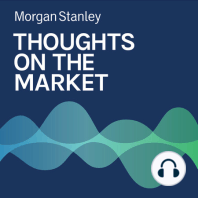4 min listen
Seth Carpenter: The Political Economy
ratings:
Length:
5 minutes
Released:
Oct 11, 2022
Format:
Podcast episode
Description
All over the world elections are taking place that will have profound effects on both local and global economies, so where are policy moves being made and how might investors use these moves to anticipate economic shifts? ----- Transcript -----Welcome to Thoughts on the Market. I'm Seth Carpenter, Global Chief Economist for Morgan Stanley. Along with my colleagues, bringing you a variety of perspectives, I'll be talking about political economy and how elections have consequences. It's Tuesday, October 11th, at 8 a.m. in New York. Economics is a relatively new field, born in 1776 after the publication of Adam Smith's 'Wealth of Nations'. But until the 1900s, everyone called it political economy. Politics and economics are still hard to separate. Fiscal policy is only sometimes the result of economic events, but almost always a driver of economic outcomes. And because of its power, uncertainty about policy can be a drag all by itself. Brazil has a second round ballot on October 30th between the incumbent Bolsonaro and former President Lula. Both candidates are likely to change or scrap an existing fiscal rule that caps government spending, but most observers think that Lula is likely to have a looser fiscal stance of the two. And so while our LatAm team questions not whether fiscal deficits will increase, but by how much, last week's congressional elections could lead to a split government which is taken to mean a smaller size of any deficit widening. So our LatAm team is pointing to a different risk that a possible President Lula, and he currently leads in most polls, that there might be an unwinding of recent reforms for state owned enterprises, the public sector and labor markets that were meant to enhance Brazil's competitiveness. As is often the case, politics here is more about the medium term than the immediate. In the U.K., it wasn't exactly the same thing. The newly appointed UK Prime Minister, Liz Truss, announced an ambitious fiscal package, including an energy price freeze and the biggest set of tax cuts since the 1970s. The echo to 1980s supply side economics was plain in terms of politics. In terms of economics, boosting productivity might allow more growth and lower inflation at a time where the opposite of each is at hand. But in a country with a 95% debt to GDP ratio and following on fiscal expansion that drove inflation through demand, the lack of details on how to pay for the tax cuts and the energy subsidies elicited a sharp, immediate market reaction. The gilt curve sold off sharply, and the pound reached an all time low of 103 against the dollar. The Bank of England intervened, buying gilts to contain volatility and to lower rates. And in the wake of that turmoil, Chancellor Kwarteng scrapped the tax cuts for the top bracket but kept the rest, leaving about £43 billion a year of additional cost. The outcome now seems to be a faster pace of hiking by the bank and an awareness that the U.K. will not have the fiscal space needed to avoid a recession. Barring unorthodox moves like scrapping the remuneration of bank reserves at the Bank of England, the Chancellor is going to need to find 30 to £40 billion in spending cuts to stabilize the debt to GDP ratio over the next five years. In Italy, elections brought a center right populist coalition led by Giorgia Meloni to a majority in both the lower house and the Senate. The Coalition's stated policy goals are expansionary. More social spending and labor tax cuts are top priorities, along with increasing pension benefits. Our economists estimate that the proposed measures would increase the deficit by roughly 2 to 4 percentage points of GDP, boosting the debt to GDP ratio next year. Such policies will prove difficult during a time of rising interest rates and heightened market scrutiny about debt dynamics. So, Maloney recently expressed her willingness to respect the EU budget rules, but reconciling that view with the policy priorities is going to be a challenge. Ou
Released:
Oct 11, 2022
Format:
Podcast episode
Titles in the series (100)
Andrew Sheets: A Second (and Third) Opinion for Equity Markets by Thoughts on the Market
